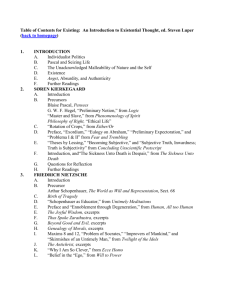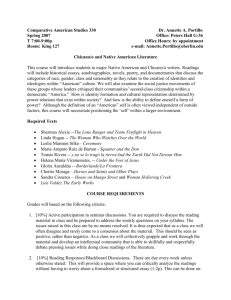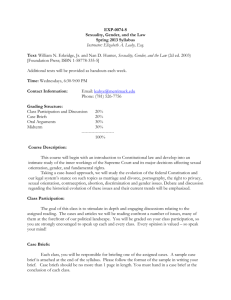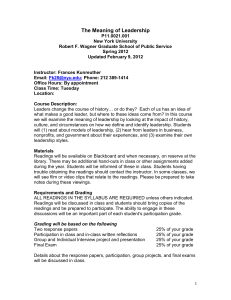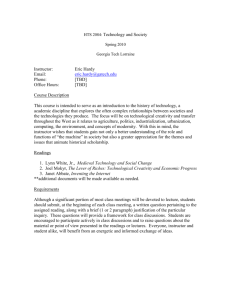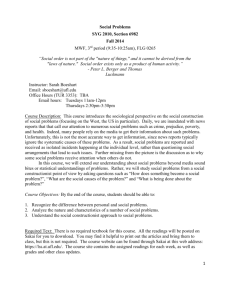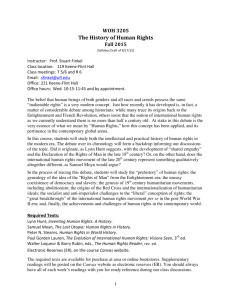EL 68F Course Syllabus - Department of Western Languages and
advertisement
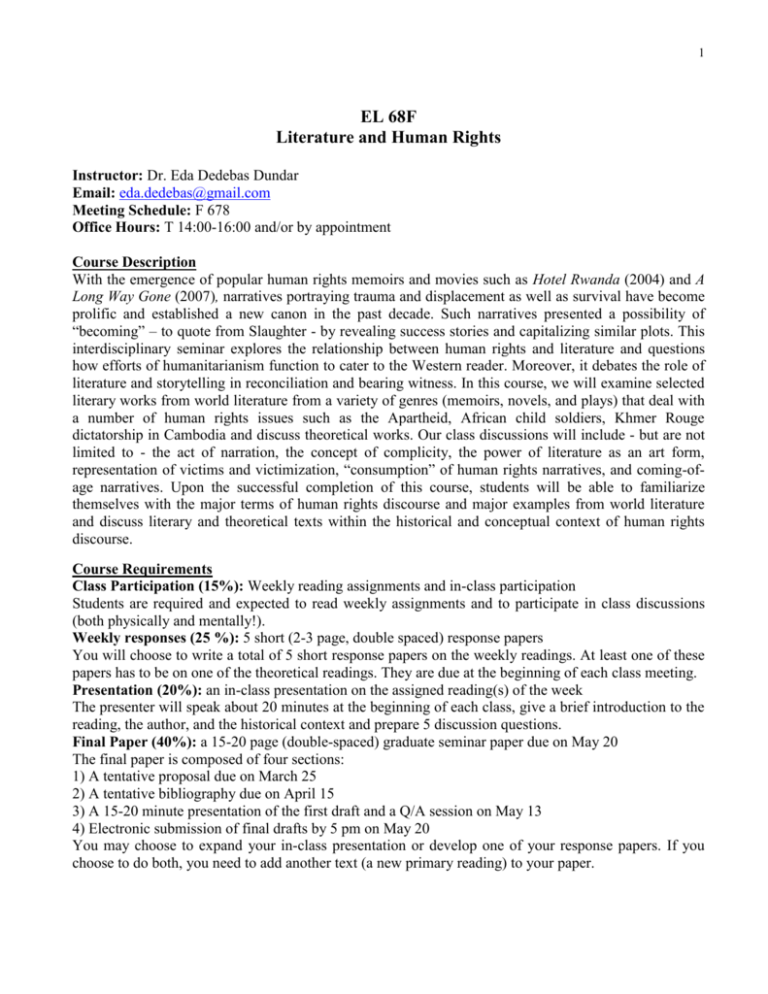
1 EL 68F Literature and Human Rights Instructor: Dr. Eda Dedebas Dundar Email: eda.dedebas@gmail.com Meeting Schedule: F 678 Office Hours: T 14:00-16:00 and/or by appointment Course Description With the emergence of popular human rights memoirs and movies such as Hotel Rwanda (2004) and A Long Way Gone (2007), narratives portraying trauma and displacement as well as survival have become prolific and established a new canon in the past decade. Such narratives presented a possibility of “becoming” – to quote from Slaughter - by revealing success stories and capitalizing similar plots. This interdisciplinary seminar explores the relationship between human rights and literature and questions how efforts of humanitarianism function to cater to the Western reader. Moreover, it debates the role of literature and storytelling in reconciliation and bearing witness. In this course, we will examine selected literary works from world literature from a variety of genres (memoirs, novels, and plays) that deal with a number of human rights issues such as the Apartheid, African child soldiers, Khmer Rouge dictatorship in Cambodia and discuss theoretical works. Our class discussions will include - but are not limited to - the act of narration, the concept of complicity, the power of literature as an art form, representation of victims and victimization, “consumption” of human rights narratives, and coming-ofage narratives. Upon the successful completion of this course, students will be able to familiarize themselves with the major terms of human rights discourse and major examples from world literature and discuss literary and theoretical texts within the historical and conceptual context of human rights discourse. Course Requirements Class Participation (15%): Weekly reading assignments and in-class participation Students are required and expected to read weekly assignments and to participate in class discussions (both physically and mentally!). Weekly responses (25 %): 5 short (2-3 page, double spaced) response papers You will choose to write a total of 5 short response papers on the weekly readings. At least one of these papers has to be on one of the theoretical readings. They are due at the beginning of each class meeting. Presentation (20%): an in-class presentation on the assigned reading(s) of the week The presenter will speak about 20 minutes at the beginning of each class, give a brief introduction to the reading, the author, and the historical context and prepare 5 discussion questions. Final Paper (40%): a 15-20 page (double-spaced) graduate seminar paper due on May 20 The final paper is composed of four sections: 1) A tentative proposal due on March 25 2) A tentative bibliography due on April 15 3) A 15-20 minute presentation of the first draft and a Q/A session on May 13 4) Electronic submission of final drafts by 5 pm on May 20 You may choose to expand your in-class presentation or develop one of your response papers. If you choose to do both, you need to add another text (a new primary reading) to your paper. 2 Readings Course books are available at BU Bookstore and a course packet that include other readings will be available. Course Schedule Week 1: February 12 Introduction to course policy and schedule Week 2: February 19 Literature and Human Rights excerpts from Hunt, Lynn. Inventing Human Rights. New York: Norton, 2008. (Introduction) Nussbaum, Martha C. “Democratic Citizenship and the Narrative Imagination.” Yearbook of the National Society for the Study of Education. 107. 1. April 2008. 143-157. Rorty, Richard. “Human Rights, Rationality, and Sentimentality.” Headline Series. Winter 1998. 116126. Slaughter, Joseph. “Enabling Fictions and Novel Subjects: The Bildungsroman and International Human Rights Law.” PMLA 121.5 (2006): 1405-1423. Suggested reading: Schultheis Moore, Alexandra and Elizabeth Swanson Goldberg. “Introduction.” Theoretical Perspectives on Human Rights and Literature. Eds. Alexandra Schultheis Moore and Elizabeth Swanson Goldberg. 1-16. Week 3: February 26 Ethics and Compassion excerpts from Butler, Judith. Precarious Life: The Powers of Mourning and Violence. New York: Verso, 2004. (Chapter 2) excerpts from Levinas, Emmanuel. The Levinas Reader. Ed. Sean Hand. Oxford: Blackwell, 2009. (Chapter 5, Ethics as First Philosophy) excerpts from Turner, Bryan. Vulnerability and Human Rights. University Park: Penn State University Press, 2006. (Chapter 1) Suggested reading: Butler, Judith. Frames of War. New York: Verso, 2009. Week 4: March 4 Ethical Spectatorship excerpts from Oliver, Kelly. Witnessing: Beyond Recognition. Minneapolis: University of Minnesota Press, 2001. (Chapter 1) Scarry, Elaine. “The Difficulty of Imagining Other Persons.” The Handbook of Interethnic Coexistence. Ed. Eugene Weiner. New York: Continuum Publishing, 1998. 40-62. excerpts from Schaffer, Kay and Sidonie Smith. Human Rights and Narrated Lives. New York: Palgrave Macmillan, 2004. (Introduction and Chapter 1) excerpts from Susan Sonntag Regarding the Pain of Others. New York: Picador, 2003. (Chapters 5, 6 3 and 7) Week 5: March 11 Commoditization of Human Rights excerpts from Baxi, Upendra. The Future of Human Rights. New Delhi: Oxford, 2002. (Chapter 7) Mutua, Makau. “Savages, Victims, and Saviors: The Metaphor of Human Rights.” Harvard International Law Journal 42.1 (2001): 201-245. Plowman, Gillian. “Yours Abundantly, From Zimbabwe.” Plays for Today by Women. Eds. Cheryl Robson and Rebecca Gillieron. Twickenham: Aurora Metro Press, 2013. 13-53. Suggested reading: Chouliaraki, Lilie. The Spectatorship of Suffering. London: Sage, 2006. (Chapter 1) Week 6: March 18 The Complexity of Complicity: Victim vs. Perpetrator Slovo, Gillian. Red Dust. London: Virago, 2000. Suggested readings: Driver, Dorothy. “Gillian Slovo’s Red Dust (2000).” Scrutiny2 12.2 (2007): 107-122. Kossew, Sue. “The State of Violence: The Politics of Truth and Reconciliation: Gillian Slovo’s Red Dust and Nadine Gordimer’s The House Gun.” Writing Women, Writing Place: Contemporary Australian and South African Fiction. London: Routledge, 2004. 150-162. Week 7: March 25 Humanitarian Intervention Tentative Proposal DUE Beah, Ishmael. A Long Way Gone: Memoirs of a Boy Soldier. New York: Farrar, Straus and Giroux, 2007. Suggested readings: Dedebas, Eda. “A Long Way Gone and Allah is not Obliged: The ‘Disabling’ Child Soldier Narrative and Representation of Vulnerability.” Journal of Commonwealth and Postcolonial Studies. 16.2 (2010): 56-74. Schultheis, Alexandra. “African Child Soldiers and Humanitarian Consumption.” Peace Review: A Journal of Social Justice. 20.1 (2008): 31-40. Week 8: April 1 Humanitarian Intervention (cont.’d) Dau, John Bul. God Grew Tired of Us. Washington, D.C.: National Geographic, 2008. Suggested movies: God Grew Tired of Us. (2007). Dir. Christopher Quinn. Good Lie. (2014). Dir. Phillippe Falardeau. Week 9: April 8 4 Literature, Writing, and Activism Cetin, Fethiye. My Grandmother: An Armenian-Turkish Memoir. Trans. Maureen Freely. London: Verso, 2008. Hirsch, Marianne. “The Generation of Postmemory.” Poetics Today. 29.1 (Spring 2008): 103-128. Week 10: April 15 Literature, Writing, and Activism (cont.’d) Tentative Bibliography DUE Ghosh, Amitav. The Hungry Tide. London: Mariner, 2006. Suggested Readings: Tomsky, Terri. “Amitav Ghosh’s Anxious Witnessing and the Ethics of Action in Hungry Tide.” The Journal of Commonwealth Literature 44.1 (2009): 53-65. Weik, Alexa. “The Home, the Tide, and the World: Eco-Cosmopolitan Encounters in Amitav Ghosh’s The Hungry Tide.” Journal of Commonwealth and Postcolonial Studies. 13-14.2-1 (2006): 120-141. SPRING BREAK (April 18-22) Week 11: April 29 Dark Tourism and Spectatorship Evans, Christine. “Trojan Barbie.” War Plays. New York: NoPassport Press, 2012. 18-98. Filloux, Catherine. “Killing the Boss.” Dog and Wolf & Killing the Boss. South Gate: NoPassport Press, 2011. 107-210. Suggested reading: Willis, Emma. Theatricality, Dark Tourism, and Ethical Spectatorship. New York: Palgrave Macmillan, 2014. (Introduction) Week 12: May 6 Writing, Testimony, and Language Linden, Sonia. I have before me a Remarkable Document Given to me by a Young Lady from Rwanda. London: Aurora Metro Press, 2004. Suggested readings: Christine Evans’s Mothergun Catherine Filloux’s Photos from S-21 Week 13: May 13 Mini-conference A 6-8 page draft to be presented at the mini-conference. Be ready to ask and receive questions! Week 14: May 20 Final Papers DUE
